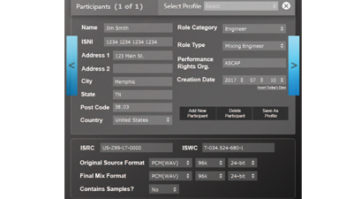
Back in 2005, authors David Kusek and Gerd Leonhard suggested in their book, The Future of Music, that someday we’d move away from downloading and buying CDs, and instead have constant access to an endless stream of songs wherever we went. Music would become something akin to a utility, like water or electricity, because no longer would we make individual purchases as we acquired songs or albums; instead, we’d just pay a monthly bill and have access to millions of songs, all the time. What a crazy idea, right?
It seemed a little far out 12 years ago for a number of reasons—the primary ones being technology and bandwidth hurdles, of course, but one of the secondary problems was how an all-digital music business would handle album credits if there was no physical list traveling with the track anymore. How would those people get paid if nobody knew what they’d done? All we could do was shrug and hope that if the tech powers-that-be could figure out music as a utility, surely they could figure out this credit issue, too.
Well, streaming is here, but getting credits consistently into the digital realm remains a problem. In response to that, The Producers & Engineers Wing of the Recording Academy has had an ongoing information campaign, Give Fans The Credit, for a few years now, working to raise awareness of the need for accurate credits, looking at everything from how to collect and distribute that information in an accurate and standardized manner, to how and where to store and display it. As a result, the industry has come to understand how crucial that credit metadata is, and why it should ideally be documented onsite throughout the production of a track.
There are a number of different outfits trying to find the best way to gather credits, and more seem to be popping up all the time. Just this past fall, a non-profit, promusicdb, opened its doors, aiming to create a massive database of musician and audio pro credits, including recording work. Then in December, another start-up debuted—Jammber—which acts as a centralized online service for creating metadata throughout a recording session while also dispensing and tracking paperwork to ensure everyone gets paid.
They may be the latest services capturing this information, but they’re not alone, and this creates a new conundrum: How are rights services, record labels and the like supposed to deal with credits when they’re preserved in a slew of different metadata formats?
To find out, I spoke with Mark Isherwood, the secretariat of Digital Data Exchange (DDEX, pronounced Dee-Dex), a non-profit consortium of media companies, music licensing organizations, digital service providers (DSPs) and technical intermediaries, working to create voluntary digital supply chain standards that support efficient distribution of digital content. Founded in 2006, DDEX was created because “right owners, but also DSPs were receiving information about the [music] and then the sales coming back with lots and lots of proprietary formats, so they might be handling 30, 40 or more different formats for basically the same transaction,” said Isherwood.
A 2013 study showed there had been a 66 percent reduction of operations expenses over five years for the various digital music entities that adopted DDEX’s data exchange standards. So even if those entities now faced having to actually pay people what they were owed (something that’s not always a priority in the music business), they still saved money in process.
With that kind of progress under its belt, DDEX has now turned its eye to recording credits with the introduction of a metadata format called RIN—Recording Information Notification—which should be of interest to producers, engineers, musicians and anyone else who’d prefer to get paid for work on a recording. To get the scoop on what RIN is, and what it can become, see my January 2017 issue article, DDEX Rolls Out RIN to Capture Credits






